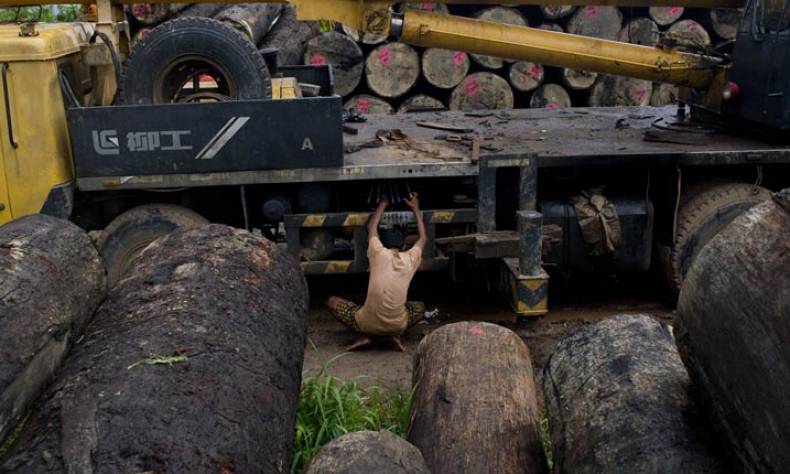
Diplomatic Channels Hasn’t Helped China’s Illegal Loggers…Yet
One reason I like living in Beijing is its convenience with regards to shopping, the city’s stores offering the widest price range for goods and services possible (if only the same range would extend to housing). For consumer goods such as apparel, jewelry, furniture, or electronic products, it is just as easy to find expensive, deluxe products in shiny shopping malls as it is to visit one of the city’s wholesale markets and get a much cheaper price for a lower quality product.
Last week, I was planning on finishing the decoration my new apartment, and the final step was to purchase new furniture. My first choice for furniture was for items made from solid wood; I wanted strong, durable furniture and was willing to pay a little extra for it.
I looked all over Beijing for my furniture-to-be, traveling to a number of medium- and high-end malls as I searched for the wooden furniture I so desired, only to find that the price was seemingly unaffordable. Nearly every salesperson I encountered would proudly tell me that their wooden furniture was imported from countries such as Canada, the U.S., Russia, Brazil, and Myanmar. I wondered if that was why it was so expensive.
After failing to find what I wanted in the city’s department stores, I turned to the innumerable outlet stores in hopes of finding some real bargains. Indeed, these stores were much cheaper, but most stores claimed that their products were also made from imported logs. A salesman told me that after the flooding of the Yangtze River in 1998, attributed to excess runoff caused by rampant logging, China has taken a more severe stance towards the commercial logging of its forests. To better protect the Yangtze and Yellow rivers, 13 provinces introduced a logging ban the following year, and in 2007, China put an end to furniture exports made from domestic timber.
On March 18, 2015, Chinese authorities issued new guidelines to reduce logging in China, stating that the commercial harvest of planted forests will be reduced by 20 percent and logging on state-owned natural forests fully prohibited by 2020.
Seeing this news, Chinese people may feel relief that the government has seemingly become so environmentally aware. After all, it is understandable that people want to live near greenery, be they urban or rural residents. What if, however, the domestic ban ends up causing widespread damage to vulnerable forests in other countries?
On July 22, a court in Myanmar sentenced 153 Chinese nationals to life imprisonment for illegal logging, the continued deforestation of the country a major concern for the government.
Life imprisonment for illegal logging? It is hard to believe that such a harsh sentence could exist in this world, and the Chinese foreign ministry has expressed their concerns about the issue. Myanmar activist Maung Zarni told the Voice of America that Myanmar will eventually bow to Chinese pressure and that those imprisoned will be likely be released early and deported.
Even if diplomatic pressure does secure their release, it will not be the end of the story. To protect their nationals, China really needs to address why these illegal loggers ran such a high risk so to break Myanmar law by logging despite a ban and then smuggling the goods to China?
According to a new Chatham House report, China is now the world’s largest importer and consumer of wood-based products, as well as a key processing hub, accounting for half of all trade in illegal wood-based products.
Regions along Myanmar’s border with China have long been hotbeds for the illegal trade in timber to feed Chinese demand, contributing to a degree of resentment in Myanmar towards its northern neighbor.
China has already signed agreements with timber-exporting nations in Southeast Asia and “developed a draft national timber legality verification system (TLVS)” , yet the country still lags behind other major timber-importing countries as it has no legislation in place banning the import of illegal wood-based products.
Vigorous laws and tough enforcement are required if China wants to prevent more of its people from being detained for illegal cross-border smuggling.
 Facebook
Facebook
 Twitter
Twitter
 Linkedin
Linkedin
 Google +
Google +



Comments are closed.